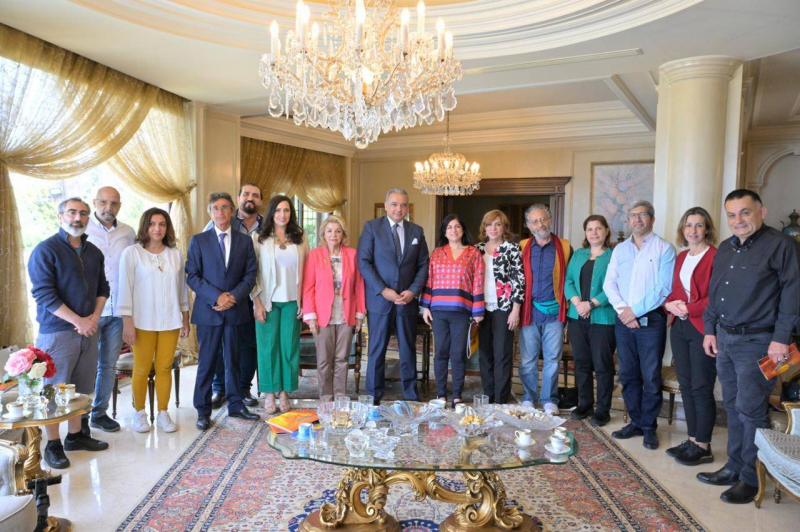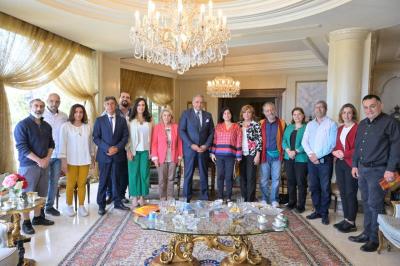As part of his participation in the events of "Tripoli, Capital of Arab Culture 2024", a delegation from the National Higher Institute of Music, headed by Dr. Hiba Al-Qawas, visited the Minister of Culture in the caretaker government, Judge Mohammad Wisam Al-Murtada, at his residence in Tripoli. The visit aimed to brief the Minister on a set of proposed local and international cultural and musical projects for participation in the national event.
The conservatoire delegation included members of the board of directors, administrators, and a technical, artistic, and media team, preparing for events suggested to be organized in several historical and archaeological sites, contributing to the enrichment of the "Tripoli, Capital of Arab Culture" occasion in a way befitting the city. This supports the reassertion of Tripoli’s civilizational face as known during its periods of brilliance and prosperity.
Tripoli was the focus of the meeting with Minister Al-Murtada, who participates in most cultural events and activities organized to commemorate the occasion. His commitment led him to temporarily move to the city to fulfill this national mission primarily from his position as Minister of Culture, engaging with officials, activists, and associations in the city regarding everything presented for Tripoli to ensure the success of the national event. Al-Murtada emphasized that "the rise of Tripoli is akin to the renaissance of Lebanon," as he provided a comprehensive explanation about the city to the music institute delegation.
In this context, Al-Murtada highlighted the significant role Tripoli plays nationally due to its rich history and its substantial presence in history, politics, culture, and science, along with its strategic Mediterranean location, souks, and historical sites. He emphasized its unifying national role in bringing the Lebanese together, reflecting on the city as an icon that has provided many examples of nationalism, rejection of sectarianism, and support for intellectuals and scholars, distancing itself from all that has happened in its modern history, which does not represent the people of Tripoli who always seek openness, peace, and a respectful coexistence with others.
"This is what I have sensed from the people of the city and its leaders through my multiple participations in various cultural activities held on the occasion of 'Tripoli, Capital of Arab Culture,'" Al-Murtada added, affirming before his visitors that Tripoli possesses all the historical, cultural, economic, tourism, environmental, and humanitarian components that qualify it not only to be chosen by the Arab organization for education, culture, and science (ALECSO) as "Capital of Arab Culture 2024" but also to be the beacon for igniting the flame of peace in Lebanon and the region. "From here, Lebanon can find salvation."
Dr. Al-Qawas presented a special booklet to Minister Al-Murtada, containing the cultural and musical projects planned to be held in Tripoli, designed by the National Conservatoire specifically for the event. The projects will involve national orchestras, musicians, and students, and will feature renowned Arab and international artists, musical concerts, in addition to workshops and educational seminars that will be presented at all archaeological and heritage sites in Tripoli to revive the rich value of these locations. "Only through culture can we build bridges, and this scene opens doors that have long remained shut on Tripoli's cultural distinction," Al-Qawas stated.
At the conclusion of the cultural day in Tripoli, the national conservatoire delegation toured some of the heritage sites in Tripoli where musical activities are scheduled to take place, including the Rashid Karami International Exhibition, the old souks, the port, Khan Al-Askar, and other sites. The aim was to technically and artistically assess these locations and begin coordination with local stakeholders to develop a practical plan in preparation for organizing conservatoire activities there, which will be announced once the preparations and arrangements are completed.




